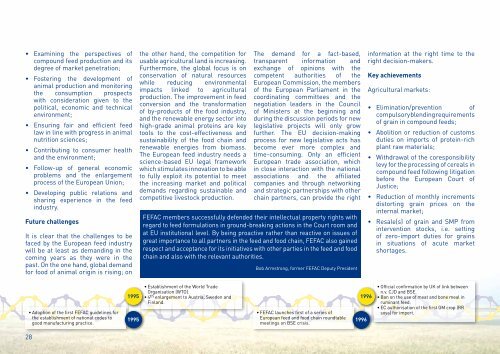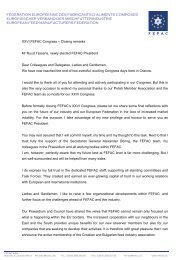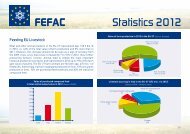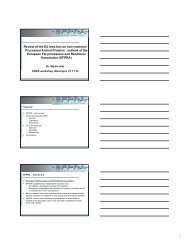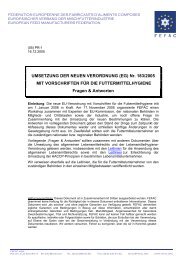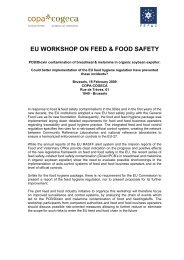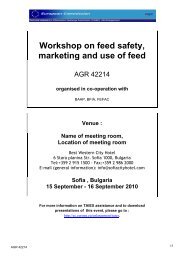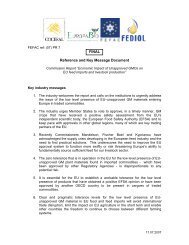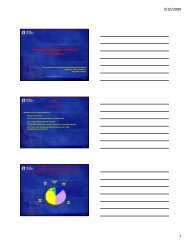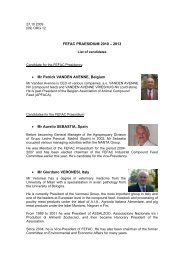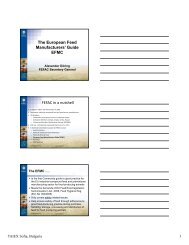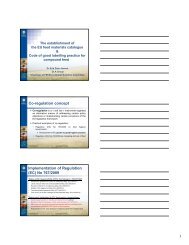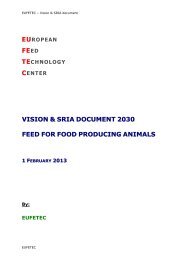Brochure (PDF) - Fefac
Brochure (PDF) - Fefac
Brochure (PDF) - Fefac
Create successful ePaper yourself
Turn your PDF publications into a flip-book with our unique Google optimized e-Paper software.
• Examining the perspectives of<br />
compound feed production and its<br />
degree of market penetration;<br />
• Fostering the development of<br />
animal production and monitoring<br />
the consumption prospects<br />
•<br />
with consideration given to the<br />
political, economic and technical<br />
environment;<br />
Ensuring fair and efficient feed<br />
law in line with progress in animal<br />
nutrition sciences;<br />
• Contributing to consumer health<br />
and the environment;<br />
• Follow-up of general economic<br />
problems and the enlargement<br />
process of the European Union;<br />
• Developing public relations and<br />
sharing experience in the feed<br />
industry.<br />
Future challenges<br />
It is clear that the challenges to be<br />
faced by the European feed industry<br />
will be at least as demanding in the<br />
coming years as they were in the<br />
past. On the one hand, global demand<br />
for food of animal origin is rising; on<br />
• Adoption of the first FEFAC guidelines for<br />
the establishment of national codes to<br />
good manufacturing practice.<br />
28<br />
1995<br />
1995<br />
the other hand, the competition for<br />
usable agricultural land is increasing.<br />
Furthermore, the global focus is on<br />
conservation of natural resources<br />
while reducing environmental<br />
impacts linked to agricultural<br />
production. The improvement in feed<br />
conversion and the transformation<br />
of by-products of the food industry,<br />
and the renewable energy sector into<br />
high-grade animal proteins are key<br />
tools to the cost-effectiveness and<br />
sustainability of the food chain and<br />
renewable energies from biomass.<br />
The European feed industry needs a<br />
science-based EU legal framework<br />
which stimulates innovation to be able<br />
to fully exploit its potential to meet<br />
the increasing market and political<br />
demands regarding sustainable and<br />
competitive livestock production.<br />
The demand for a fact-based,<br />
transparent information and<br />
exchange of opinions with the<br />
competent authorities of the<br />
European Commission, the members<br />
of the European Parliament in the<br />
coordinating committees and the<br />
negotiation leaders in the Council<br />
of Ministers at the beginning and<br />
during the discussion periods for new<br />
legislative projects will only grow<br />
further. The EU decision-making<br />
process for new legislative acts has<br />
become ever more complex and<br />
time-consuming. Only an efficient<br />
European trade association, which<br />
in close interaction with the national<br />
associations and the affiliated<br />
companies and through networking<br />
and strategic partnerships with other<br />
chain partners, can provide the right<br />
FEFAC members successfully defended their intellectual property rights with<br />
regard to feed formulations in ground-breaking actions in the Court room and<br />
at EU institutional level. By being proactive rather than reactive on issues of<br />
great importance to all partners in the feed and food chain, FEFAC also gained<br />
respect and acceptance for its initiatives with other parties in the feed and food<br />
chain and also with the relevant authorities.<br />
• Establishment of the World Trade<br />
Organisation (WTO).<br />
• 4 th enlargement to Austria, Sweden and<br />
Finland.<br />
Bob Armstrong, former FEFAC Deputy President<br />
• FEFAC launches first of a series of<br />
European feed and food chain roundtable<br />
meetings on BSE crisis.<br />
1996<br />
1996<br />
information at the right time to the<br />
right decision-makers.<br />
Key achievements<br />
Agricultural markets:<br />
• Elimination/prevention of<br />
•<br />
compulsory blending requirements<br />
of grain in compound feeds;<br />
Abolition or reduction of customs<br />
duties on imports of protein-rich<br />
plant raw materials;<br />
• Withdrawal of the coresponsibility<br />
levy for the processing of cereals in<br />
compound feed following litigation<br />
before the European Court of<br />
Justice;<br />
• Reduction of monthly increments<br />
distorting grain prices on the<br />
internal market;<br />
• Resale(s) of grain and SMP from<br />
intervention stocks, i.e. setting<br />
of zero-import duties for grains<br />
in situations of acute market<br />
shortages.<br />
• Official confirmation by UK of link between<br />
n.v. CJD and BSE.<br />
• Ban on the use of meat and bone meal in<br />
ruminant feed.<br />
• EC authorisation of the first GM crop (RR<br />
soya) for import.


